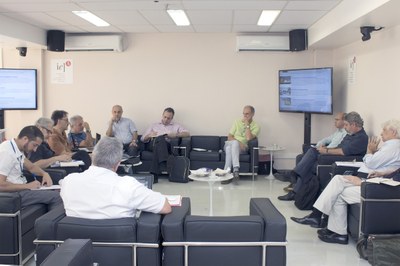IEA creates working group to discuss the water crisis in São Paulo
 |
|---|
|
First meeting of the working group on |
In order to contribute to discussions about the water crisis affecting the Southeast of Brazil and manifesting more severely in São Paulo, where the water supply is at risk, the IEA has created a working group to reflect critically on the causes of the problem and propose solutions.
The group is composed of researchers from the IEA and professors of the USP, all specialized in the field of water resources. The coordinators are Wagner Costa Ribeiro, a member of the IEA's research group on Environment and Society, and Marcos Buckeridge, a professor at the USP's Institute of Biosciences. The group met for the first time on February 19. Besides Martin Grossmann, director of the IEA, the attendants were professors Renato Luiz Anelli, Hamilton Varela, José Carvalheiro, Jean Paul Metzer, José Pedro Costa, Marcio Automare and Pedro Jacobi.
The meeting has resulted in the definition of priority axes of analysis and discussion, which will serve as guidelines in the preparation of an action plan aimed at mitigating the consequences of prolonged drought and to prevent water shortage scenarios to occur in the future:
- Adoption of a rather preventive than curative logic in water resources management;
- Multi and transdisciplinary challenges in the analysis of key issues;
- Feasibility of the private model of water management in São Paulo;
- Houses and environmental conservation in watershed areas;
- Reforestation and tree planting;
- Global reality in the field of public health;
- Legislation and the new forest code;
- Population clarification (scientific communication);
- Human rights;
- Climate changes;
- Economy aspects;
- Complex systems approach.
Photo: Sandra Codo/IEA-USP
